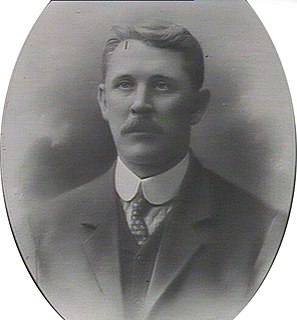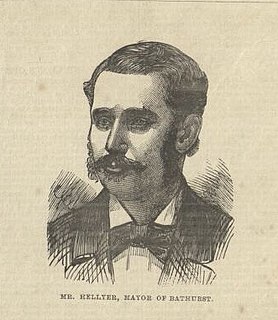Related Research Articles

Bathurst (County) was an electoral district of the Legislative Assembly in the Australian state of New South Wales, named after Bathurst County and including the rural part of the county. The electorate did not include the town of Bathurst which was included in Western Boroughs, until Bathurst was created in 1859. Bathurst (County) was replaced by Carcoar, East Macquarie and West Macquarie in 1859.
Macquarie, until 1910 The Macquarie was an electoral district of the Legislative Assembly in the Australian state of New South Wales, created in 1894 and named after the Macquarie River. It was re-created in 1904, retaining nothing but the name, then abolished in 1920.

William Patrick Crick was an Australian politician, solicitor and newspaper proprietor. He was described by author Cyril Pearl as an irresistible demagogue, who "looked like a prize fighter, dressed like a tramp, talked like a bullocky, and to complete the pattern of popular virtues, owned champion horses which he backed heavily and recklessly."

Sir William McMillan was an Australian businessman and politician. He was a member of the first federal parliament and served as deputy leader of the Free Trade Party under George Reid, but served only a single term before resigning. He had earlier served in the Parliament of New South Wales, including as Colonial Treasurer, and was prominent in the movement for Federation. He was born in Ireland and became a successful businessman in Australia after moving to Sydney at the age of 18.

James Henry Young was an Australian colonial businessman and politician and Speaker of the New South Wales Legislative Assembly.
Thomas Henry Thrower was an Australian politician. He was an Australian Labor Party member of the New South Wales Legislative Assembly from 1904 to 1907 and 1910 to 1917, representing the electorate of Macquarie.

James Ashton was an Australian politician.

David Buchanan was a barrister and politician in colonial New South Wales, a member of the New South Wales Legislative Assembly and later, the New South Wales Legislative Council.
James Ebenezer Tonkin was an English-born Australian politician.

Walter Hussey Vivian was an Australian politician.

Thomas Henry Hellyer was an Australian politician and solicitor.
Benjamin Lee was an English-born Australian politician.

Francis Henry Bryant was an Australian politician.
A by-election was held for the New South Wales Legislative Assembly electorate of Goulburn on 16 August 1890 because of the death of William Teece.
Blayney, an electoral district of the Legislative Assembly in the Australian state of New South Wales was created in 1904 and abolished in 1913.
A by-election was held for the New South Wales Legislative Assembly electorate of East Macquarie on 26 August 1867 because of the resignation of David Buchanan to return to Scotland.
In October 1894 the Elections and Qualifications Committee conducted a re-count of the 1894 Grenfell election, in which George Greene had been declared elected by a margin of 2 votes over Michael Loughnane (Labour). The Elections and Qualifications Committee consisted of 9 members, 5 Free Trade and four Protectionist.
West Macquarie, an electoral district of the Legislative Assembly in the Australian state of New South Wales was created in 1859 and abolished in 1904.
A by-election for the seat of West Macquarie in the New South Wales Legislative Assembly was held on 2 July 1884 because of the resignation of Thomas Hellyer.
A by-election was held for the New South Wales Legislative Assembly electorate of West Macquarie on 21 December 1859 because John McPhillamy resigned.
References
- 1 2 "Mr William Patrick Crick (1862–1908)". Former Members of the Parliament of New South Wales . Retrieved 1 May 2019.
- ↑ "Writ of election: West Macquarie". New South Wales Government Gazette . No. 640. 14 November 1890. p. 8815. Retrieved 5 May 2021– via Trove.
- ↑ "Supply: Mr John Davies". Parliamentary Debates (Hansard) . New South Wales: Legislative Assembly. 3 October 1889. pp. 5972–5984.
- ↑ "Parliament of New South Wales: Legislative Assembly". The Sydney Morning Herald . 5 October 1889. p. 7. Retrieved 5 May 2021– via Trove.
- 1 2 3 4 5 "Financial statement". Parliamentary Debates (Hansard) . New South Wales: Legislative Assembly. 12 November 1890. pp. 5164–5193.
- ↑ Rutledge, Martha; Nairn, Bede. "Crick, William Patrick (1862–1908)". Australian Dictionary of Biography . Melbourne University Press. ISSN 1833-7538 . Retrieved 15 August 2020– via National Centre of Biography, Australian National University.
- 1 2 Twomey, Anne (2004). The Constitution of New South Wales. Federation Press. pp. 442. ISBN 9781862875166 . Retrieved 24 November 2020.
- ↑ "Mr Crick at Perth - another violent speech". The Daily Telegraph . 22 November 1890. p. 5. Retrieved 5 May 2021– via Trove.
- ↑ "Nomination of candidates". The National Advocate . 2 December 1890. p. 2. Retrieved 5 May 2021– via Trove.
- ↑ "The West Macquarie Election". The Sydney Morning Herald . 18 November 1890. p. 5. Retrieved 5 May 2021– via Trove.
- ↑ "The West Macquarie Election: The candidature of Mr C Boyd". The Daily Telegraph . 17 November 1890. p. 5. Retrieved 5 May 2021– via Trove.
- ↑ "Mr Boyd's candidature". The Daily Telegraph . 28 November 1890. p. 5. Retrieved 5 May 2021– via Trove.
- ↑ "The West Macquarie Election: Mr Charles Boyd's candidature". The National Advocate . 29 November 1890. p. 2. Retrieved 5 May 2021– via Trove.
- 1 2 Green, Antony. "1890 West Macquarie by-election". New South Wales Election Results 1856-2007. Parliament of New South Wales . Retrieved 5 May 2021.
- 1 2 Crick v Butler [1891] NSWLawRp 28 , (1891) 12 LR (NSW) 75(20 May 1891), Supreme Court (Full Court)